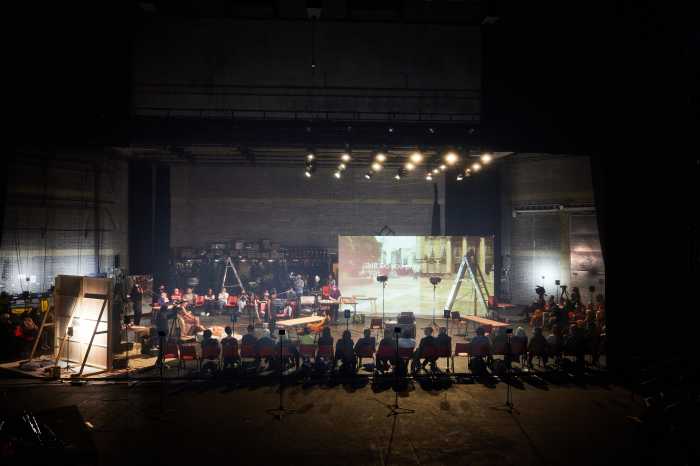 [/media-credit]
[/media-credit]David Cromer’s direction, Nina Raine’s ‘Tribes’ is season’s best
BY CHRISTOPHER BYRNE | In the course of our lives, we are — or become — part of any number of tribes. Each has its rules, hierarchies, communications and secret handshakes. I mean the last metaphorically, of course, but one of the ways we identify ourselves is by the tribes we are part of.
Whether it’s a family, school, workplace or — in the case of Nina Raine’s shatteringly moving new play, “Tribes” — the deaf community, how we see ourselves is often in direct relationship to our place within a tribe. As we grow and change, discover and define ourselves, our tribes may change, as may our roles within them, but how we know ourselves is always in relation to the other members. Conflict and, in this case, profound theater can result from those roles changing or the individuals inhabiting those roles evolving, upsetting the stasis essential to a tribe and to the dependability and predictability that give us comfort.
Raine’s play begins in an overly educated British intellectual home where the members of the family — parents and three adult children — find themselves living under one roof again. As often happens, each member of the family picks up their familiar roles. The opening scenes of the play are hilarious as the family bickers and argues in ways that have their roots in decades-old behaviors.
Christopher, the father, is a former college professor turned writer, too clever by half, curmudgeonly and critical. Beth, the mother, is also a writer, constantly trying to negotiate among the family members. Daniel, one son, has a history of mental illness and is trying to complete a graduate thesis, while daughter Ruth is floundering and at the time the play opens hoping to become an opera singer. Billy, on the other hand, is deaf. He has been raised as if normal and is an adept lip reader, but still he is unable to participate fully in the rambunctious arguments that pass for familial affection.
When Billy meets Sylvia, his world changes. The hearing daughter of deaf parents, she communicates in sign language and grieves for the fading of her own hearing that will lead to complete deafness. Billy falls in love with her, and, as he finds himself immersed in the deaf community, a place where he is accepted and understood, he comes to see his family and his role in it as limiting.
But, of course, it is not that simple. Raine’s story beautifully navigates the crisis that Billy’s change touches off as each character tries to discover who they are in a shifting context. Along the way, the playwright explores the artificial constructs held together by shared illusions in any tribe. Being branded “the quiet one,” “the social one,” or whatever within a family becomes deeply entrenched within the collective consciousness of the tribe — and those images persist long after time has made them untrue.
In Raine’s play, when Billy finds his voice, it is met with disbelief that leads to chaos. The play is so finely detailed and human that it creates empathy for each of the characters but also for the family organism as well.
Director David Cromer is firmly in his element here. No other working director can accumulate the details of lives so powerfully as he does. His orchestration of Raine’s play leads the audience fully into the family’s world and touches something so fundamental about the longing and loss we all experience in growing beyond our families that it is almost overpowering, more so because it creeps up on us so subtly throughout the play.
In addition to Cromer’s superb work, a magnificent in-the-round set by Scott Pask that pulls us deeply into the action, and brilliant sound design by Daniel Kluger, the cast is simply magnificent. Jeff Perry is outstanding as Christopher, as he tries to hold on as the world shifts around him. Mare Winningham is heartfelt and moving as Beth. Teetering on the brink of a breakdown, Will Brill is fragile and complex as Daniel — and Gayle Rankin is sharp and touching as Ruth.
The evening, however, belongs to Russell Harvard as Billy and Susan Pourfar as Sylvia. Harvard is an astonishing presence, at once powerful and vulnerable. It is his change, conveyed with integrity and focus, that drives the play. Simply put, Harvard’s is the best performance by an actor I’ve seen this season.
Pourfar, who is an extraordinary actress I’m always thrilled to see, has never been better than as Sylvia. She is brilliant as she loses her hearing and, with it, what she has known about herself. Technically, the performance is razor-sharp, with her speech changing as the character goes deaf — in devastating synchronicity with her emotional journey.
How we hear, how we see ourselves, how others see us, and how we find our way in and out of the tribes that populate our existence is the stuff of living. These issues are also the stuff of the best play of the season. Do not miss it.
Tribes
Written by Nina Raine
Directed by David Cromer
Through June 3
Tues.-Sun, at 7:30pm
Sat.-Sun., at 2:30pm
At the Barrow Street Theatre
27 Barrow St., btw. Seventh Ave. & W. Fourth St.
For tickets ($75, $95), call 212-868-4444 or visit smarttix.com



































